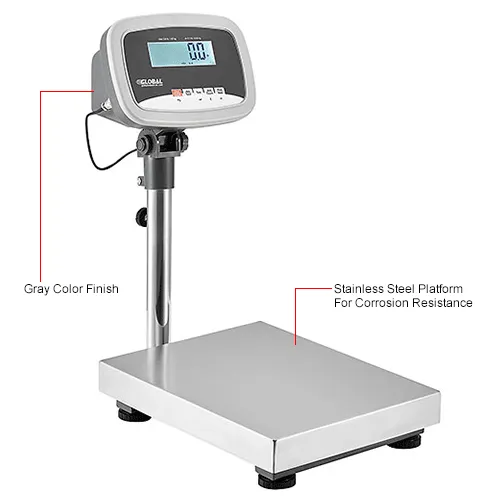Why Industrial Scales Are Important for Maximizing Storehouse Operations
Industrial scales play a pivotal role in maximizing storehouse procedures by providing accurate weight dimensions that are essential for efficient supply monitoring and streamlined delivery procedures. The true effect of industrial ranges extends beyond plain precision-- understanding their wider ramifications could transform functional methods in unforeseen means.
Improved Precision in Weighing
In several stockroom operations, attaining improved precision in considering is essential for the overall performance and reliability of inventory monitoring. Precise considering permits for specific monitoring of item amounts, which is important for maintaining optimum stock levels and minimizing waste. Industrial scales designed for storage facility atmospheres give high levels of accuracy, thereby minimizing the margin for mistake in stock analyses.
Executing sophisticated evaluating modern technology, such as electronic scales with calibration attributes, makes certain that weights are consistently exact throughout numerous loads. This accuracy is especially important when taking care of high-value things or bulk materials, as inconsistencies can result in significant economic losses. Exact weighing contributes to compliance with industry policies, which usually mandate accurate measurement for security and high quality guarantee.
Furthermore, improved weighing accuracy enables much better decision-making concerning logistics and supply chain administration. With specific information available, storehouse managers can anticipate need better, prepare for replenishment, and optimize storage space application. Ultimately, the combination of accurate commercial scales right into warehouse operations sustains not just prompt functional needs but likewise long-lasting tactical goals targeted at boosting general productivity and profitability.
Improved Stock Monitoring
Reliable stock monitoring is important for enhancing warehouse operations and making sure that sources are utilized effectively. Industrial scales play a crucial function in this procedure by offering exact weight measurements that directly influence inventory monitoring and control. By integrating these scales right into stock monitoring systems, stockrooms can achieve real-time data precision, which is crucial for preserving optimum supply degrees.
The capability to weigh items properly enables much better projecting and replenishment approaches. With accurate weight information, warehouse supervisors can determine discrepancies between expected and actual supply levels, therefore minimizing overstocking or stockouts. This accuracy also helps in classifying products according to weight, which can improve storage space performance and improve order picking processes.
Additionally, enhanced stock management fosters better vendor connections and client fulfillment. Precise weight dimensions promote conformity with shipping policies and reduce the chance of costly errors during the purchase process. In essence, commercial ranges not just enhance the precision of stock documents yet likewise add to general operational efficiency, ultimately leading to lowered expenses and boosted service distribution in storage facility procedures.
Streamlined Delivery Procedures
A substantial facet of stockroom efficiency is the streamlining of shipping procedures, which can greatly enhance general performance and consumer satisfaction. Effective shipping operations make sure that products are dispatched precisely and in a timely fashion, directly impacting customer experience and retention.

Furthermore, incorporating commercial ranges right into storehouse management systems helps with real-time monitoring of stock and shipments, improving openness throughout the delivery procedure - Industrial Scales. This assimilation not only accelerates the gratification cycle however likewise improves communication amongst staff, bring about more quicker decision-making and less traffic jams
Furthermore, structured shipping procedures can decrease labor costs, as teams can work extra efficiently with clear standards and precise information at their fingertips. By adopting industrial scales, stockrooms can attain a much more systematic approach to delivery, inevitably increasing their operational performance and sustaining a stronger lower line.
Waste Decrease Methods
Optimizing stockroom operations expands past structured shipping processes to incorporate waste reduction methods that considerably add to general performance and cost-effectiveness (Industrial Scales). Applying industrial ranges is a crucial element of these approaches, enabling precise dimension of materials and products, which decreases overages and reduces excess stock

One more essential method is the optimization of packaging. Industrial ranges assist in exact weight measurements, allowing for customized packaging remedies that lessen excess products. This not just lowers waste however likewise decreases shipping expenses, as lighter bundles often incur reduced products costs.
Data-Driven Choice Making

Utilizing data produced from industrial scales permits stockroom managers to track supply levels extra properly, bring about notified purchasing decisions and reducing overstock or stockouts. This data can be assessed to identify trends in item movement, making it possible for better projecting and resource allotment.
The insights got from weight data additionally help with efficiency dimension against vital efficiency indications (KPIs), such as throughput rates and order precision. By employing sophisticated analytics, warehouse operations can uncover ineffectiveness, improve process, and minimize functional expenses.
Eventually, data-driven decision making empowers companies to make proactive modifications, ensuring that stockroom operations stay active and responsive to market needs. Purchasing commercial scales not only improves data collection however also transforms that data into workable knowledge, positioning stockrooms for continual competition and growth.
Final Thought
In summary, industrial scales play a crucial duty in maximizing storage facility procedures via improved precision in considering, improved supply monitoring, and structured delivery processes. These scales add to waste reduction strategies and help with data-driven decision-making, ultimately promoting operational performance. By leveraging accurate weight dimensions, warehouses can reduce inconsistencies, decrease expenses, and foster boosted customer complete satisfaction. The assimilation of commercial scales into stockroom management systems is therefore vital for achieving optimum efficiency and resource appropriation.
Industrial ranges play a crucial function in optimizing storage facility procedures by reference supplying specific weight dimensions that are important for reliable inventory administration and structured delivery procedures. Industrial scales made for storehouse settings give high degrees of accuracy, thus reducing the margin for mistake in supply analyses.
In significance, industrial ranges not only enhance the accuracy of inventory records but likewise add to general operational efficiency, ultimately leading to decreased costs and improved service distribution in stockroom operations.
In recap, industrial scales play a crucial duty in optimizing stockroom procedures through improved precision in considering, improved supply monitoring, and structured delivery processes. The assimilation of industrial scales into storehouse administration systems is hence paramount for accomplishing optimal performance and source allotment.